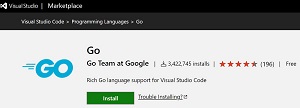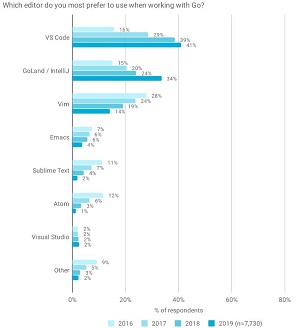News
VS Code Go Language Extension Goes from Microsoft to Google
Citing the need for "more maintenance and support," Microsoft and Google have announced that further development of the Microsoft-led Go programming language extension for Visual Studio Code has been taken over by Google.
Microsoft has led the community development effort for the open source project for some five years while working closely with the Go team at Google that created the programming language, often called Golang.
The companies came to the conclusion that the Go team would be the best steward of the tool going forward.
"During the last few years working together with the Go team, it's been clear they are in the best position to advance the tooling ecosystem for Go and ensure that it evolves alongside the language," Microsoft's VS Code dev team said in a June 9 blog post.
 [Click on image for larger view.] Go Extension (source: VS Code Marketplace).
[Click on image for larger view.] Go Extension (source: VS Code Marketplace).
The Go extension in the Visual Studio Code Marketplace -- now announcing it comes from the "Go Team at Google" -- has been installed more than 3.4 million times, earning an average 4.5 (0-5 scale) from 196 developers who reviewed it.
With development carried out on GitHub, the project has moved from the Microsoft/vscode-go repository to the golang/vscode-go repo.
It uses a language server called gopls that was spearheaded by Google and subsequently supported in VS Code with the help of Microsoft, along with more than a dozen independently maintained, integrated tools, to provide rich language support for Go in VS Code. The Language Server Protocol powers a wide variety of language servers that provide functionality like auto complete, go to definition, find all references and so on from within VS Code. The VS Code Go extension specifically provides IntelliSense, code navigation, symbol search, bracket matching, snippets and more.
"As the VS Code Go extension grows in popularity and as the ecosystem expands, it requires more maintenance and support," Google said in its own blog post. "Over the past few years, the Go team has collaborated with the VS Code team to help the Go extension maintainers. The Go team also began a new initiative to improve the tools powering all Go editor extensions, with a focus on supporting the Language Server Protocol with gopls and the Debug Adapter Protocol with Delve.
"Through this collaborative work between the VS Code and Go teams, we realized that the Go team is uniquely positioned to evolve the Go development experience alongside the Go language."
 [Click on image for larger view.] Go Developer Survey (source: Golang.org).
[Click on image for larger view.] Go Developer Survey (source: Golang.org).
A Go developer survey published in April indicated the the VS Code extension for Go was used by 41 percent of Go developers.
That indicated a steady climb in popularity for VS Code in the Go community. In announcing the Go 2018 Survey last year, Golang.org said, "Last year, VS Code edged out Vim as the most popular Go editor among survey respondents,. This year it significantly expanded its lead to become the preferred editor for over one-third of our survey respondents (up from 27 percent last year). GoLand also experienced strong growth and is now the second most-preferred editor at 22 percent, swapping places with Vim (down to 17 percent). The surging popularity of VS Code and GoLand appear to be coming at the expense of Sublime Text and Atom."
Both Go and VS Code are popular among developers.
In the recent huge developer survey conducted by Stack Overflow, Go placed:
- third in "most wanted" programming language rankings ("percent of developers who are not developing with the language but have expressed interest in developing with it")
- fifth in the "most loved" category ("percent of developers who are developing with the language and have expressed interest in continuing to develop with it")
- 12th in the most commonly used programming language rankings
VS Code, meanwhile, was named the No. 1 tool in the the "most popular developer environment" category in last year's survey (there was no equivalent ranking in the 2020 SO survey).
About the Author
David Ramel is an editor and writer at Converge 360.